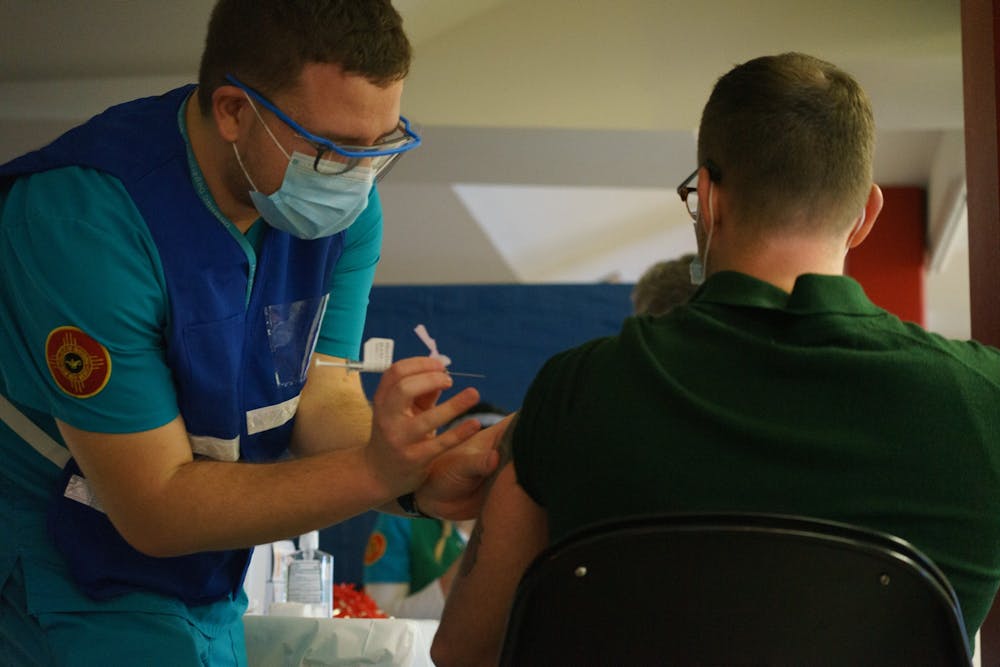(02/26/21) EDITOR'S NOTE: This article has been updated to correct factual inaccuracies regarding which individuals are currently eligible to receive the vaccine, according to updated information from the NMDOH.
As the state continues to work through phase 1B of its vaccination plan, the University of New Mexico is strongly urging faculty and students to sign up for vaccinations.
In an effort to help motivate registration, ASUNM senators passed legislation on Jan. 27 encouraging individuals to make plans for receiving the vaccine “to increase the vaccinated population and help provide for herd immunity.”
“We want to inform the student population,” ASUNM senator Helen Zhao said. “Not many people know where to sign up for the vaccine, and some of the process is confusing.”
To register for the vaccine, all employees and students must sign up through the New Mexico Department of Health (NMDOH) Vaccine Registration System — UNM and UNM Hospital are not offering vaccines.
“Our governor and state have, probably for the best, taken the conversation away from an institution's ability to shape (the vaccination processes),” Dr. James Wilterding, executive director of Student Health and Counseling, said. “We can vaccinate the most vulnerable as a priority by doing it this way.”
UNM President Garnett Stokes said in her weekly campus-wide email on Feb. 1, “employees and students should be given release from other obligations so that they can receive the vaccine and make up any missed work,” noting that there is little flexibility regarding vaccine appointment times.
Faculty and students must fall into one or more specific categories of vulnerability — 75 years or older or at-risk and 16 years or older— to qualify for vaccine prioritizations under phase 1B, which began for New Mexicans on Jan. 8. Despite being listed under phase 1B, frontline essential workers who are unable to work remotely and “vulnerable populations,” such as those housed in detention facilities or homeless shelters, are not currently eligible to receive the vaccine, according to NMDOH.
A resident assistant at the UNM Student Residence Center apartments noted that Residence Life and Student Housing employees have been offered vaccinations. Additionally, a staff member at UNM’s main dining hall — La Posada — said that their supervisor verified vaccinations would also soon be available to them.
“I feel safer,” Oluoma Edeh, a sophomore research student at the UNM Health Sciences Center, said after receiving the vaccine. “I wouldn’t say my (social) routine has changed much, but I think students should get vaccinated.”
Vaccinations are a vital component of building herd immunity.
“Herd immunity is enough (population) immunity against the infectious agent to impair its ability to spread,” Wilterding said.
Get content from The Daily Lobo delivered to your inbox
He added that the spread rate is an inherent feature of measuring how infectious a virus is. With no public health measures, the spread rate for COVID-19 is three — meaning that one infected person infects three more (or 100 infected people spread the contagion to 300 others).
Approximately 60-75% of the population need to have immunity to keep the spread rate below one, so a few individuals getting the vaccine won’t be enough.
“We still need to wear masks and take precautions, because we don’t know yet if you can spread COVID even if you are vaccinated and asymptomatic,” Wilterding said.
Lisa Cacari Stone, PhD, a lead panelist on a discussion on vaccine equity put on by Project ECHO and NMDOH, raised alarms regarding barriers to the vaccine. She mentioned such issues as transportation, language and the digital divide.
“Trust and transparency are priority issues that came up in the panel and also nationally,” Cacari Stone said, regarding whether the vaccines will get distributed equitably.
Cacari Stone questioned how NMDOH invites individuals based on registration and advocated for the release of data regarding who has thus far been vaccinated by race, ethnicity and socioeconomic factors.
“With adequate data, you can do better public health planning,” Cacari Stone said.
In California, it was uncovered that vaccine registration codes for hard-hit Latino and Black communities were wrongly circulating through other affluent areas according to the Los Angeles Times, highlighting the need to address factors that affect equitable distribution.
“(We are trying to address) how can we help people get accurate information and make a decision they are comfortable with,” Wilterding said.
Wilterding also suggested that the vaccine may be offered on campus in the near future.
“I think that it’s possible that sometime later this year, we might start having UNM-focused shot clinics on campus for people who fall into the latter (vaccine distribution) categories,” Wilterding said.
Nikita Jaiswal is a freelance reporter at the Daily Lobo. She can be contacted at news@dailylobo.com or on Twitter @NikitaJswl






